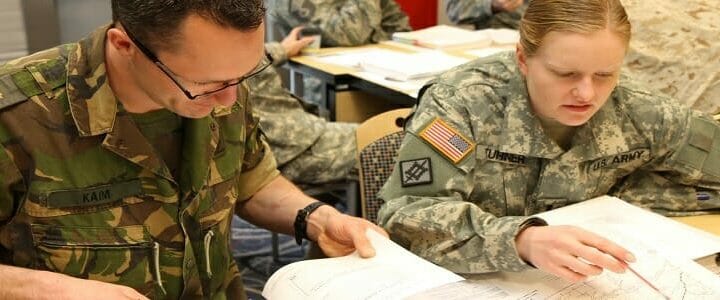In the military, you probably most aligned with both your branch of service and your military job or occupation. You may also have changed military jobs at various points in your career. To the extent you held a profession, it would have been the ‘Profession of Arms’ for those in the U.S. Army, or an affiliation more tied to your unit or squad. Affiliating with your military branch continues after you leave military service, but you’ll also take on a new professional role, within a civilian industry (unless you’re pursuing full time retirement).
Entire websites are dedicated to helping veterans match their military job to a civilian job. But there’s another important point to consider – how does your military job align with a civilian industry? Stepping back and examining your transition from the macro level will help you in two ways:
- Determining what university degree to pursue if you plan to use your GI bill.
- Narrowing down your job search to commonly identified industries.
Some truly directed university students will set off to college with a very specific job path in mind – teacher, financial planner, or accountant. The vast majority attend college with an industry in mind – business, communications, or political science, for instance. Over time, those broad industries are narrowed into a specific field, but that generally doesn’t come without some amount of trial and error.
One of the most common problems I see with veterans I encounter at career fairs and networking events is a vague pursuit of a job or career rather than a targeted interest in an industry they’re excited to join. Many veterans know their leadership skills are in demand, and after a career in the military, program management is a logical fit. Unfortunately, there are currently 1300 openings in management on ClearanceJobs.com, and they range from a business continuity manager working in an office to a logistics manager in an aviation facility.
In addition to being vague, you rarely encounter someone who holds a ‘passion’ for program management. In contrast, many veterans do have a passion for agile processes, training, or aviation. Consider an industry you’re passionate about, and target your job search that way – your job search will be easier, and you’ll be a more interesting candidate for recruiters.
In all likelihood, program manager may be the job title you land in. But it likely isn’t the industry you’ll launch an exciting career toward. The U.S. Department of Labor website for veterans, My Next Move, allows you to browse careers by broader career industries. Spend some time searching positions that way, and you may come across job titles related to your interests and skills you hadn’t otherwise considered.
As you consider how your military skills translate into a civilian career, don’t just have a job in mind, but consider what industries most entice your interest. As you speak with recruiters and hiring managers, they’ll be much more interested in hearing your passion for manufacturing, and how you’d like to put your Air Force experience to work as an electrical mechanic, or as a manager overseeing a team of mechanical drafters. Start with your passion for an industry, and drill it into the career options available.
These are common industries to consider:
| Administrative and Support Services | Manufacturing |
| Arts and entertainment | Media and Communication |
| Construction | Mining, Gas and Oil |
| Education | Professional, Science and Technical |
| Farming, Forestry, Fishing and Hunting | Real Estate and Rentals |
| Finance and Insurance | Retail |
| Government | Service |
| Health and Counseling | Transportation and Storage |
| Hotel and Food | Utilities |
| Management | Wholesale and Commercial Sales |
You may be thinking – wait – if the problem for many veterans is not having a specific career path in mind, how does broadening the search to industries make my job search easier? Keep in mind that most employers post positions by industry. Yes, there are specific job titles associated with the positions, but because of the vast disparity in how each company labels positions, job titles may not tell you the full story. You may want to pursue a career in IT. IT skills are needed in virtually every industry out there. You may want to work as an analyst – data professionals are needed in virtually every industry out there. Consider an industry where you can be passionate – whether it’s hospitality or transportation – and then drill down into the specific positions your military job prepared you for, or the civilian skills you’d like to learn using your GI Bill.




